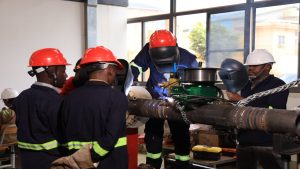Share
Small and medium-sized businesses (SMEs) have a lot of opportunities as Uganda’s oil and gas industry develops.
SMEs must, however, improve their operational capacities and tailor their plans to the unique requirements of the industry if they are to fully take advantage of these prospects.
Key industry participants have worked extremely hard to portray the oil and gas value chain as one that is extremely intensive and large, full of chances for SMEs to take advantage of, particularly in the local context.
Opportunities in the oil and gas value chain include the creation of a variety of occupations as well as the supply of goods and services for the downstream activities. With almost 15,000 direct employees, there will be a significant demand for housing, food, and medical care, among other things.
Boosting Functional Capabilities
A thorough analysis of the role of SMEs, the difficulties they encounter, and the tactics they might use to succeed in the oil and gas business was presented and identified at a recent X Space event hosted by the Uganda Chamber of Mines and Petroleum (UCMP).

The Federation of Small and Medium-Sized Enterprises of Uganda (FSME) Executive Director, John Walugembe, underlined during the event how important it is for SMEs to strengthen their capacities in areas like standards, supply chain management, financial management, and emerging fields like environmental, social, and governance (ESG) issues.
He claimed that because the oil and gas industry needs strict compliance and high standards, this holistic approach is essential. SMEs may put themselves in a position to not only survive but also prosper as the industry changes by strengthening these capabilities.
Even while we wait for the first oil production, we have urged our members to keep improving their capabilities in terms of standards, supply, financial management, and developing sector demands including environmental, social, and governance challenges. They will be able to prosper as well as exist without oil thanks to this, according to Walugembe.
It is important to remember that capacity-building initiatives are essential in getting SMEs ready for opportunities in the oil and gas industry. Walugembe emphasized that several SMEs have already profited from programs supported by the African Development Bank and the Stanbic Business Incubator.
Furthermore, TotalEnergies-funded Industry Enhancement Center keeps pushing for increased involvement in capacity-building initiatives. All agree that additional work is necessary to adequately equip SMEs for the impending prospects, notwithstanding their efforts.
In order to acquire contracts from oil firms, Thomas Ayebare Rukundo, Manager of Economic and Financial Analysis at the Petroleum Authority of Uganda (PAU), emphasized the significance of diversity, equity, and inclusivity in SME capacity-building initiatives.
He outlined several prospects in ring-fenced goods and services, including civil works, transportation, security, catering, and human resource management. He claimed that the fact that these opportunities exist shows that SMEs may profit greatly from the expansion of the sector provided they are properly prepared and strategically aligned.
Employment and Economic Impact
The oil and gas industry has enormous potential to boost employment and economic expansion. Over 13,000 employment have already been created, according to Rukundo, and 90% of these roles are held by Ugandans, many of whom are from host communities.
This emphasizes the industry’s contribution to regional job growth and community development. Additionally, 5,000 people have benefited from SME capacity-building initiatives, and more are anticipated in the near future. This suggests that the necessity to give local firms the tools they need to compete in the industry is becoming increasingly apparent.
Rukundo declared, “We are happy to report that some SMEs in Uganda are already beneficiaries.” He continued by saying that contracts in the oil and gas industry have been signed for a total of US$7.9 billion, of which US$1.7 billion have been given to Ugandan enterprises.
It should be mentioned that Uganda’s upstream, middle, and downstream portions of the oil and gas value chain present a lot of chances for local SMEs. The 1,400-kilometer oil pipeline that runs from Hoima to Tanzania’s Tanga Port is part of the midstream section, while the upstream portion consists of drilling, building, and civil works. For local companies, the downstream segment—which deals with distributing finished oil products to consumers—offers a number of options.
Uganda has put laws and policies into place to promote local SME involvement in the oil and gas industry. Among these regulations is the local content policy, which stipulates that specific industry operations must be reserved for Ugandan businesses.
This system of policies creates an atmosphere that is conducive to SMEs entering the industry. The success of these programs, however, depends on SMEs’ capacity to compete successfully and achieve the necessary requirements.
Many SMEs who want to work in the oil and gas industry still face significant obstacles in getting access to financing. Due to the capital-intensive nature of the industry, firms require development and assistance before they can attract investors.
To position themselves for success, SMEs must also interact with sector players, look for collaborations, and comprehend the nuances of the industry.









